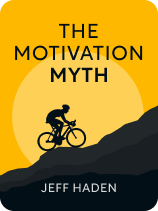

This article is an excerpt from the Shortform book guide to "The Motivation Myth" by Jeff Haden. Shortform has the world's best summaries and analyses of books you should be reading.
Like this article? Sign up for a free trial here.
Why should you find a teacher to help you on your path to success? How can a teacher act as a mentor?
Teachers and professionals are good mentors to emulate because they’ve succeeded where you strive to be. In The Motivation Myth, Jeff Haden stresses the importance of finding a teacher who agrees to act as your mentor so you can learn from their experiences.
Keep reading to learn how a teacher/mentor can help you achieve greatness.
How to Find a Teacher
To design your path to success, Haden suggests finding a high-achieving teacher/mentor that is a professional to emulate. Study how they achieved what you’re after, and determine the steps they took along the way. Haden stresses the difference between a professional and a coach, gives clues as to how to emulate their path to accomplishment, and suggests ways to place yourself in the right surroundings to gain access to a variety of professionals to learn from.
Haden recommends using a professional, not a coach, as a model because, unlike a coach, a professional won’t cheer you on or cut you any slack. A professional who isn’t a mentor by trade will simply explain what it takes to succeed and expect you to do it. The trick is to channel their experience and techniques. Once you’ve identified a person to emulate, you don’t even have to meet them in real life—just pick someone whose path you want to mirror, and do what they did without taking shortcuts. It’s not actually the person themself that you need but the program for success that they used.
(Shortform note: Though Haden debates the relative merits of coaches versus professionals as role models, there are other types of relationships you can use to advance you toward your goals—namely, mentors and sponsors. A mentor is distinct from a coach in that your relationship with them isn’t transactional. It’s a coach’s job to help you develop skills and motivation, whereas a mentor helps guide you as a way to “pay it forward” and invest in the future of their field or community. A sponsor, on the other hand, is someone who helps you advance toward your goal not by developing your skills but by boosting your visibility and reputation, which can be essential in fields where networking is of paramount importance.)
Haden says to start by picking one thing your professional exemplar does that would point you toward your goal, then do it even if it seems to go against your normal behavior. If they’re a novelist, perhaps they wake up hours before you do to write while everyone else is asleep. If they’re a top-ranked public speaker, maybe they do vocal warmups every morning as part of their exercise routine. Whatever activity you select will stretch you in ways you aren’t accustomed to and will grow your skills in ways you might not have expected.
(Shortform note: If you follow Haden’s advice and seek out a career mentor, it may be wise to look beyond their success to other facets of their lives. Psychologists suggest that it’s important for your role models to reflect your values in addition to the achievements you’d like to emulate. That way, their example can guide you through the emotional ups and downs of your journey and not just the path to success. Beyond demonstrating how to achieve your goals, a good role model can show how to do so with integrity and professionalism.)
Meet Your Teacher in Person
It may be that you find it difficult to emulate an example from a distance. On the other hand, it wouldn’t be productive to stalk the person you want to emulate and badger them for suggestions. Instead, Haden suggests joining a group such as a club of experienced hobbyists or a professional organization. Being in such an atmosphere will put you in touch with many people whose personal experiences you can draw from. When joining a group, though, it’s important not to make a nuisance of yourself and drive away the people you’d like to learn from. Instead, you must diligently take steps to transition from an outsider to an insider. You can do this by:
- Showing up
- Being humble
- Volunteering for tasks
- Helping other newcomers fit in
| Be a Conscientious Joiner Before following Haden’s advice and joining a club or organization, you should evaluate whether the group is a good fit for you. You can do this by talking to some of its members to gain a feel for the organization’s culture. If possible, go to some meetings before joining fully as a member. You should also weigh the cost of group membership, not just in terms of money but also in time and energy commitment, and whether your personal return on investment will match how much you put in. Ideally, whatever organization you join will have an onboarding process for new members that will make it easier for you to take the steps Haden suggests. This might include having an orientation period to encourage attendance and help you find a place, letting you judge how your skills and values fit in with the rest of the group, providing training on how you can be of service, and charting a path to form relationships between you, older members, and fellow newcomers. |
Once you’ve made yourself part of a community full of people working toward the same goal as yours, you’ll not only have access to professionals to learn from, but you’ll also have found an invaluable network of support who can also help motivate you along your way.
(Shortform note: To maximize the benefits that Haden says you’ll receive from being part of a like-minded community, it’s as important to give as much value as you gain. In The Success Principles, Jack Canfield lists several steps to productively add value to your growing personal network, such as sharing your work and skills with others and demonstrating your reliability to the group. Just as individual practice creates a personal feedback cycle, active membership in an organization creates a mutually beneficial cycle that helps everyone in it achieve their personal goals.)

———End of Preview———
Like what you just read? Read the rest of the world's best book summary and analysis of Jeff Haden's "The Motivation Myth" at Shortform.
Here's what you'll find in our full The Motivation Myth summary:
- Why you should stop waiting for motivation to hit and instead, make your own
- How to create a cycle of positive reinforcement to boost your motivation
- How to develop resilience to get through times of struggle






